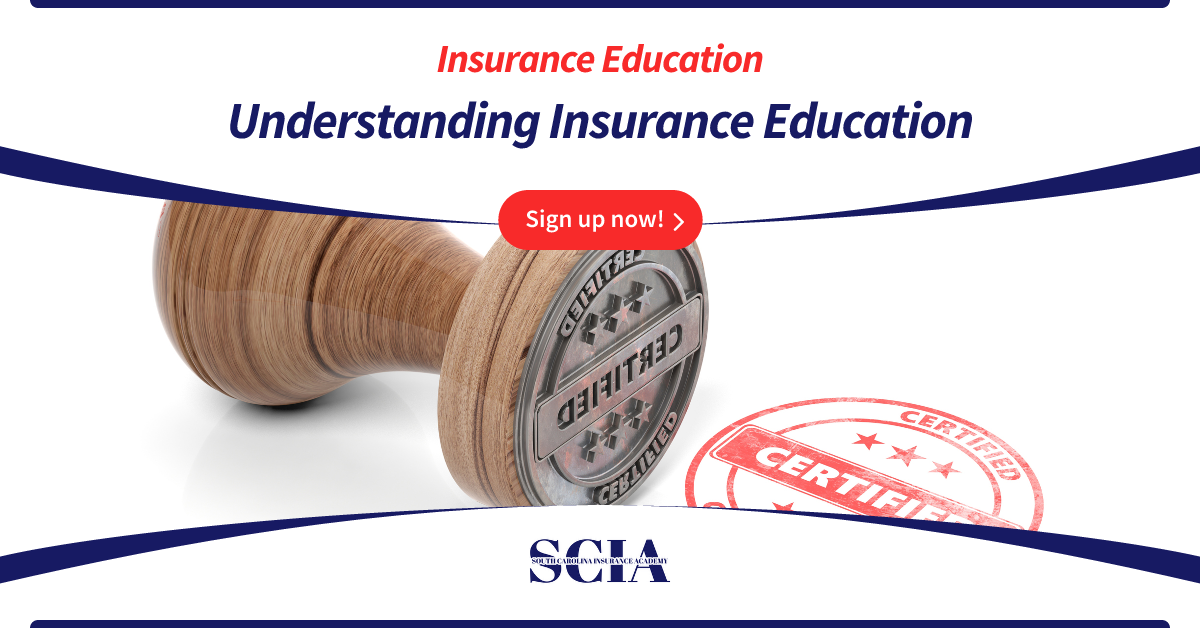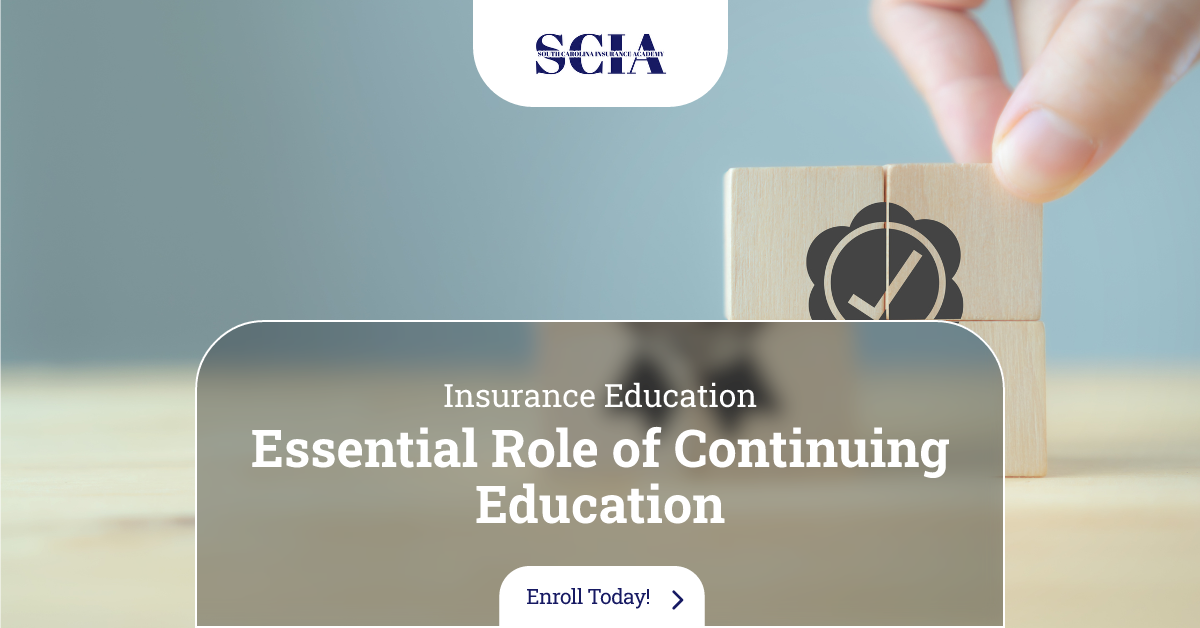|
Importance of continuing insurance education Continuing insurance education is essential for advancing your career in the insurance industry. By staying updated on the latest industry trends, regulations, and best practices, you can enhance your expertise and credibility as an insurance professional. This ongoing education also enables you to offer better service to your clients, stay competitive in the market, and open up opportunities for career growth. Embracing continuing insurance education can ultimately lead to a more successful and fulfilling career in the insurance field. Advantages of investing in insurance education Investing in insurance education can open up new career opportunities and increase your earning potential. By staying up to date with the latest industry knowledge, you can enhance your professional skills and demonstrate your commitment to ongoing learning. This will make you more attractive to employers and clients, allowing you to take on more challenging and rewarding roles within the insurance sector. Professional development in insurance can also help you stay ahead of industry trends and changes in regulations, giving you a competitive edge in the market. Types of insurance education programs available There are various types of insurance education programs available to choose from. These include online courses, webinars, workshops, seminars, and formal certification programs. Each type of program offers different levels of flexibility and depth of knowledge, allowing insurance professionals to tailor their learning to their specific needs and schedules. Cost and time commitment for insurance education Insurance education can vary in cost and time commitment, depending on the type of program you choose. Typically, certification programs can cost anywhere from a few hundred to a few thousand dollars. These programs can take several weeks to several months to complete, depending on the depth of study and the schedule you choose. On the other hand, a full-fledged degree program, such as a bachelor's or master's degree in insurance, can take several years to complete and can cost tens of thousands of dollars. Keep in mind that the cost and time commitment for insurance education can vary based on the institution, the program of study, and your individual circumstances. Career opportunities and advancement with insurance education Investing in continuing insurance education can open up new career opportunities and help you advance in the insurance industry. By expanding your knowledge and skills, you can qualify for a wider range of positions and take on more challenging roles within the industry. With the constantly evolving nature of the insurance field, staying updated with the latest trends and regulations is crucial to boosting your career prospects. Whether it's learning about new insurance products, understanding changes in policy regulations, or gaining expertise in customer service, continuing education can significantly enhance your professional growth and position you for success. Practical skills gained from insurance education Insurance education can provide you with practical skills that can enhance your career in the insurance industry. Here are some of the essential skills you can gain:
These practical skills gained from insurance education can not only boost your confidence and expertise in the industry but also make you a valuable asset to potential employers. Networking and professional growth through insurance education To boost your career in the insurance industry, networking and professional growth through insurance education is crucial. Engaging in ongoing education opportunities can expand your knowledge base and keep you updated on industry trends. Additionally, attending insurance education events and seminars allows you to connect with other professionals in the field, creating valuable networking opportunities that can open doors for future career advancement. By staying current and expanding your network, you can enhance your professional prospects and open up new career possibilities within the insurance sector. How to choose the best insurance education program When choosing an insurance education program, it's important to consider a few key factors:
By considering these factors, you can find the best insurance education program to boost your career in the industry. How to balance work and insurance education Balancing work and insurance education requires careful planning and time management. Consider the following tips to help you achieve this balance:
By following these strategies, you can find a balance between work and insurance education, paving the way for career advancement and personal growth. Success stories of professionals with insurance education Insurance education has transformed the careers of many professionals, leading to increased job opportunities, higher salaries, and greater job satisfaction. According to industry reports, professionals who pursue continuing education in insurance have experienced significant career growth, with some reporting an increase in salary and others securing leadership roles within their organizations. This higher level of expertise has also enabled professionals to provide more value to clients and companies, distinguishing them as top performers in the industry.
0 Comments
Importance of license education for insurance professionals Acquiring a license education as an insurance professional is crucial for your career advancement and credibility. It demonstrates your expertise and commitment to the industry. Here are some key advantages of obtaining license education:
Remember, obtaining a license is an essential step towards establishing yourself as a respected and competent insurance professional. Career advancement and opportunities with a license Having a license as an insurance professional can open up new career opportunities and help you advance in your current role. With a license, you can expand your job prospects by working in different areas of the insurance industry, such as underwriting, claims adjusting, or sales. You may also be eligible for higher-paying positions and have the chance to take on more responsibilities within your organization. Additionally, a license can enhance your credibility and trustworthiness as an insurance professional, making you more attractive to potential employers and clients. Enhanced industry knowledge and expertise Having a license education for insurance professionals can provide you with a deep understanding of the industry, allowing you to gain expertise and stay updated on the latest trends and regulations. This knowledge will enable you to better serve your clients and make informed decisions that can positively impact their insurance needs. Building trust and credibility with clients Building trust and credibility with clients is essential for insurance professionals. By acquiring licensed education, insurance professionals can demonstrate their expertise and commitment to their clients. This, in turn, can help them establish a strong reputation and build lasting relationships with clients. Additionally, having a license indicates that the professional has met certain standards and regulations, providing clients with peace of mind and confidence in their abilities. Regulatory compliance and legal requirements Insurance professionals must adhere to strict regulatory compliance and legal requirements to ensure they are operating within the law. By obtaining a license through proper education and training, insurance professionals can demonstrate their knowledge of and ability to comply with the legal standards set forth by regulatory bodies. This not only enhances their professional credibility but also ensures that they are equipped to handle legal obligations and responsibilities in their roles. Understanding and adhering to regulatory and legal requirements is crucial for insurance professionals to maintain integrity, trust, and ethical conduct within the industry. Networking and professional connections Networking and creating professional connections are vital for insurance professionals. By attending industry events, seminars, and conferences, you can expand your network and build relationships with other professionals in the field. This can lead to potential business opportunities, mentorship, and access to valuable resources and information. It's important to actively engage with peers and industry leaders to stay updated on the latest developments and gain insights into best practices within the insurance industry. Establishing relationships with other professionals can also open doors to career advancement and provide a support system for navigating the complexities of the insurance industry. Specializations and niche markets If you're wondering about specializations and niche markets in the insurance industry, obtaining a license education can give you an edge. By gaining expertise in specific niches such as life insurance, health insurance, or property and casualty insurance, you can tailor your services to meet the unique needs of different customer groups. This can open up new opportunities for career advancement and growth in the insurance field. Additionally, specializing in niche markets allows you to differentiate yourself from other professionals and become a go-to expert in your chosen area, ultimately expanding your client base and enhancing your earning potential. Access to exclusive resources and tools When you acquire a license education for insurance professionals, you gain access to exclusive resources and tools that can enhance your abilities in the industry. These resources and tools are designed to provide you with the latest information, best practices, and specialized knowledge that will help you excel in your role. With this access, you can stay updated on industry trends, regulations, and technologies, giving you a competitive edge in the insurance field. Continuing education and skill development Continuing education for insurance professionals is essential for staying updated with industry changes and enhancing your skills. It allows you to acquire new knowledge and stay informed about the latest industry trends, which can help you better serve your clients. Additionally, ongoing education can provide you with opportunities to develop new skills and expertise, ultimately boosting your career prospects in the insurance field. Summary: The impact of license education on insurance professionals License education provides insurance professionals with comprehensive knowledge and practical skills that are essential for excelling in the insurance industry. It enhances their understanding of insurance regulations, policies, and procedures, enabling them to offer better services to their clients. Here are some key advantages of acquiring license education for insurance professionals:
In summary, license education has a profound impact on insurance professionals, empowering them with the knowledge and skills needed to thrive in the dynamic and competitive insurance landscape. Understanding Property & Casualty Insurance Property and casualty insurance, also known as P&C insurance, provides protection to individuals and businesses for property damage, liability, and other related risks. Here are some key points for understanding property and casualty insurance:
Understanding property and casualty insurance is essential for ensuring you have the right coverage for your needs. What Does Property & Casualty Insurance Cover? Property and casualty insurance covers a wide range of risks and liabilities. Here's a brief overview of what this type of insurance typically includes:
The Cost of Property & Casualty Insurance Property and casualty insurance costs can vary depending on factors such as the type and value of your property, the location of your property, and the coverage limits you choose. According to the Insurance Information Institute, the average annual cost of homeowners insurance in the United States is around $1,200. However, this can be higher or lower based on individual circumstances. Remember that your insurance premium is often influenced by the risks associated with your property. It's essential to shop around and compare quotes from different insurers to find the best coverage at the most competitive price. Benefits of Property & Casualty Insurance Property & Casualty insurance provides coverage for damage to your property and liability for injuries and damage you cause to others. Some benefits include:
How to Choose the Right Property & Casualty Insurance Program When choosing a property & casualty insurance program, there are several factors to consider. Here are some key points to keep in mind:
Remember, choosing the right property & casualty insurance program is essential to protect your assets and mitigate potential risks effectively. Property & Casualty Insurance Application Process When applying for property and casualty insurance, you will typically go through an application process that involves providing information about your property, possessions, and any existing insurance coverage. The insurer will assess the risk associated with insuring your property and determine the premium based on factors such as the property's location, construction, and your claims history. It's important to be thorough and accurate when completing the application to ensure you receive an appropriate coverage and premium quote. Keep in mind that the specific details required for the application process may vary between different insurance companies. Step-by-Step Property & Casualty Insurance Procedure Property and casualty insurance involves several steps. Firstly, you will need to gather information about the specific property or casualty risks you want to insure. Next, you will need to assess the coverage options available and compare them to your needs. After that, you will need to select a policy that best suits your requirements. Once you have chosen a policy, you will then need to complete the necessary paperwork and make the required payments. Finally, you will receive your insurance policy and be covered for the risks outlined in the policy documents. Property & Casualty Insurance Agents and Brokers Property and casualty insurance agents and brokers play a key role in helping individuals and businesses find the right insurance coverage. They work closely with clients to assess their needs and determine the best insurance policies to protect their assets in case of property damage or liability claims. Agents typically represent specific insurance companies, while brokers work independently and can offer policies from multiple insurers. Both agents and brokers can help clients navigate through the complexities of insurance policies, explain coverage options, and assist with claims processing. Their expertise and guidance are essential for clients to make informed decisions and ensure they have the proper protection in place. Making Claims and Post-Program Support After completing the insurance program, it is important to understand the process of making claims and what post-program support is available. Claims can be made for various reasons such as property damage, theft, or liability. It is essential to contact your insurance provider as soon as possible after an incident to initiate the claims process. Post-program support can include assistance with renewing policies, making changes to coverage, and addressing any concerns or questions that arise after the program has been completed. Summary: Mastering Property & Casualty Insurance Property and casualty insurance covers a wide range of risks, such as damage to property and liability for bodily injury or damage to others' property. It can protect you from financial losses due to unexpected events and accidents. Understanding the principles and practices of property and casualty insurance is essential for individuals and businesses to ensure they have the right coverage in place. This blog will provide you with an overview of what to expect from a property and casualty insurance program, including the types of coverage available and how to assess your insurance needs. Understanding the importance of insurance license education
Insurance license education is an essential step toward becoming a knowledgeable and competent insurance professional. Acquiring a proper education provides a solid foundation for understanding the intricacies of insurance regulations, ethics, and the various products and services offered in the industry. It helps you develop the necessary skills to serve customers effectively and ensures compliance with legal requirements. Understanding the importance of insurance license education is the first step towards a successful career in the insurance industry. Initial steps to take before starting your license education journey Before starting your license education journey, it's crucial to understand the initial steps required. Here are a few key things to expect as you begin:
Choosing the right education program for insurance professionals When choosing an education program for insurance professionals, it's essential to consider factors like the program's accreditation, curriculum, and flexibility. Look for programs that are accredited by reputable organizations to ensure quality education. Consider the curriculum and ensure it covers the essential topics relevant to your area of specialization. Flexibility in scheduling and study options is also crucial to accommodate your work and personal commitments. Keep in mind that the right education program can set the foundation for a successful career in the insurance industry. The structure and curriculum of license education programs License education programs for insurance professionals typically follow a structured curriculum designed to provide a comprehensive understanding of the insurance industry. The programs cover topics such as insurance laws, regulations, ethics, and different types of insurance products. The curriculum includes interactive learning modules, case studies, and assessments to ensure a thorough grasp of the material. Additionally, the programs may require participants to complete a certain number of hours of study and pass a final exam to obtain their license. Preparing for the licensing exam Before taking the licensing exam, it's important to prepare thoroughly. You should study the relevant material to ensure you have a good understanding of the requirements. Take practice tests to familiarize yourself with the format and types of questions you may encounter. Remember to stay calm during the exam and take your time to read and answer each question carefully. Understanding the exam outline and key topics is crucial for success. Good luck with your preparations! Tips for successfully passing the exam
Navigating the licensing process and requirements Navigating the licensing process for insurance professionals involves understanding the requirements and steps needed to obtain a license. The process typically includes completing pre-licensing education, passing a licensing exam, and meeting any state-specific requirements. To ensure a smooth journey, it's important to research the specific licensing requirements in your state and to find a reputable education provider that offers the necessary pre-licensing courses. Additionally, staying updated on any changes to licensing regulations and seeking guidance from experienced professionals can help you navigate this process effectively. Continuing education and professional development Continuing education is essential for insurance professionals to stay updated with industry trends and regulations. Most states require a certain number of continuing education credits to renew your insurance license. You can fulfill these credits by attending courses, workshops, or seminars offered by approved providers. It's crucial to prioritize professional development to enhance your knowledge and skills, ensuring you meet the ongoing education requirements and advance in your insurance career. Career opportunities and growth after obtaining the license After obtaining your insurance license, you can look forward to a wide range of career opportunities and growth prospects in the insurance industry. Some potential career paths include working as an insurance agent, broker, underwriter, claims adjuster, risk manager, or insurance consultant. With additional experience and expertise, you can progress to higher-level positions such as sales manager, agency owner, or executive roles within insurance companies. The insurance industry continues to experience steady growth, providing ample opportunities for licensed professionals to advance their careers and expand their skill set. Conclusion and next steps Okay, so we've covered a lot in this blog about getting educated for a career in insurance. Now it's time to wrap things up and talk about what comes next. After reading this, you should have a good idea of what to expect when pursuing your license in the insurance industry. The next step for you is to start looking for the right program or course that fits your schedule and budget. Keep in mind that finding the right fit for you may take some time, so be patient and do thorough research. Once you're ready, you can start preparing for your licensing exam. Get your study materials in order and set a study schedule that works for you. Good luck on your journey to becoming a licensed insurance professional! Importance of continuing education in insurance Continuing education is essential in the insurance industry to keep up with the latest regulations, policies, and technologies. It helps professionals stay updated on industry trends, best practices, and new laws. By regularly participating in continuing education, insurance professionals can enhance their knowledge and skills, adapt to changes, and better serve their clients. Some of the benefits of continuing education in insurance include staying competitive in the market, maintaining professional licensure, and expanding career opportunities Advantages of ongoing learning Continuing education in insurance offers numerous advantages to professionals in the industry. Here are some of the key benefits:
Up-to-date knowledge and skills Continuing education ensures that insurance professionals stay current with the latest industry trends, laws, and regulations. By regularly updating their knowledge and skills, insurance professionals can provide more accurate and comprehensive information to their clients. Staying up-to-date with the latest developments in the insurance industry allows professionals to offer better service and remain competitive in the market. This ongoing learning process also helps professionals adapt to changes in technology and consumer needs, ultimately benefiting both the professionals and their clients. Career advancement Continuing education in the insurance industry plays a vital role in career advancement. By gaining additional knowledge and skills through ongoing education, insurance professionals can enhance their expertise and stay up-to-date with the latest trends and regulations in the industry. This not only enables them to provide better services to their clients but also opens up opportunities for promotion and higher positions within their respective organizations. Furthermore, continued education demonstrates a commitment to professional growth, which can be highly valued by employers and potential employers. Types of continuing education programs Continuing education programs for insurance learning come in various types to cater to different learning styles and preferences. Some common types include:
Professional development opportunities There are many benefits to participating in professional development opportunities within the insurance industry. Continuing education helps insurance professionals stay updated on the latest industry trends, regulations, and best practices. It also provides an opportunity to expand knowledge and skills, making individuals more competitive in the marketplace. By actively engaging in professional development, insurance professionals can enhance their expertise and position themselves for career advancement. Online courses and workshops Taking online courses and workshops can be a convenient and effective way to further your insurance learning. Online platforms offer a wide range of courses and workshops tailored to insurance professionals, covering topics such as risk management, underwriting, claims handling, and the latest industry trends. Some benefits of online learning in insurance include flexibility in scheduling, access to a diverse range of content, and the ability to learn at your own pace. Additionally, interactive features and real-world case studies can enhance your understanding and application of the material. Keep in mind that it's crucial to verify the credibility and accreditation of the online courses and workshops you choose to ensure that they provide valuable and recognized certification. Benefits of networking and collaboration Networking and collaboration in the insurance industry offer a range of benefits, including the opportunity to exchange information, learn new perspectives, and gain insights from others within the field. Building a network of contacts can provide valuable support, guidance, and opportunities for professional growth. Collaborating with colleagues, industry experts, and professionals in related fields can lead to the development of innovative ideas and solutions, as well as the potential for new business partnerships. Additionally, networking and collaboration can enhance your reputation within the industry and open doors to new career possibilities. Regulatory requirements and certifications To work in the insurance industry, it is essential to stay up to date with regulatory requirements and obtain certifications. Regulatory requirements are rules and guidelines set by governing bodies that insurance professionals must follow to comply with the law. These requirements may include obtaining a license, completing a specific number of continuing education (CE) credits, and adhering to ethical standards. Certifications demonstrate expertise in a particular area of insurance and can open up new opportunities for career advancement. By keeping up with regulatory requirements and obtaining certifications, insurance professionals can ensure that they are well-equipped to provide knowledgeable and ethical service to their clients. Conclusion: Commit to lifelong learning Learning in the insurance industry is crucial for professional growth. Committing to lifelong learning helps insurance professionals stay updated with the latest trends, regulations, and best practices. This allows them to provide better service to their clients and ensures they remain competitive in the market. By continuously seeking new knowledge and skills, insurance professionals can adapt to changing customer needs and industry developments, ultimately enhancing their career prospects and contributing to the overall success of the insurance sector. |
AuthorDonald F Mescia III is the Founder and Instructor of South Carolina Insurance Academy. Archives
July 2024
Categories |
|
Contact us Today:
South Carolina Insurance Academy 845 Houston Northcutt Blvd #1036 Mount Pleasant, SC 29464 843-789-9416 [email protected] www.scinsuranceacademy.com |





 RSS Feed
RSS Feed